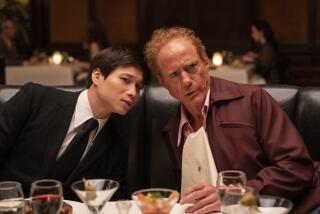Johnny’s Song : POETRY OF A VIETNAM VETERAN by Steve Mason (Bantam: $9.95; 134 pp.)
- Share via
Bantam Books, in a first printing of 35,000, has just published a book of poetry by former infantryman Steve Mason. I expected a flashback-collection of war stories. I found instead an insightful and timely collection dealing with the post-service domestic conflicts of veterans. The poem “The Casualty” does comment on the donkey-minded wartime leadership in passing but its goal is elsewhere. It acknowledges that the poorer males were more likely to become veterans only to find “. . . when we git home somebody’d moved the town.” The young veterans suffered a loss of time and opportunity that cannot be returned. A form of survivor guilt, combined with a martyr complex, can become an obsession for some:
who as sons
of poor men
must pay the price
for the believable myths
of national furors and private enterprise
. . . and let no grim greybeard of a god
speak again to us of glory
by bodycount.
In the “The Wall Within,” concerning self-made barriers, Steve Mason notes the continued cost of the war. This dramatic poem is meant for reading aloud with the hope that something will be made of the journey, a peace and truth in return. Many of the poems of “Johnny’s Song” seem meant to be read before an audience. “The Wall Within,” though it cries out for such a reading and was in fact read aloud at the dedication of “The Wall,” the Vietnam Veterans’ Memorial in Washington, D.C., also works extremely well on the page. In certain other poems the tone is too angry for print.
Fortunately, Mason’s poems in general are without extremes of rhetoric. The last poem, “After the Reading of the Names,” is my favorite. It is a quiet presentation, tightly written with gentle jabs at a too mobile American society and the irony of the names of the war dead upon a peace monument:
some call it the reading of the names
me I just call it Johnny’s song
and as much as I love the words
I’ve come to really hate the music . . .
Mason’s work is peace poetry for today, without polemics. He sends his message quietly, with a restrained hope that we may pick our future causes carefully. The risk of a few lives can be just a step away from the loss of many lives. “Angry Little Poem of Spring” discusses this momentum of conflict:
boy, crime don’t pay on a small scale
it pays on a Big one
and if that crime becomes big enough
it begins to govern--
There are minor complaints. The Vietnamese expression for “I don’t know” is “toi khong biet,” not “toi com biet.” The prefatory remarks, sounding like publicity blurbs for certain poems, are not needed; for although Steve Mason is a former captain and although I had--as an enlisted man--some reservations about a book by a former officer, the reservations were needless. The book is--in the veterans’ emphatic form of the word--out-standing.
More to Read
Sign up for our Book Club newsletter
Get the latest news, events and more from the Los Angeles Times Book Club, and help us get L.A. reading and talking.
You may occasionally receive promotional content from the Los Angeles Times.








